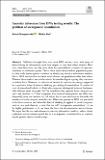| dc.contributor.author | Kampourakis, Kostas | |
| dc.contributor.author | Fux, Michal | |
| dc.date.accessioned | 2025-09-17T20:35:06Z | |
| dc.date.available | 2025-09-17T20:35:06Z | |
| dc.date.issued | 2025-05-16 | |
| dc.identifier.uri | https://hdl.handle.net/1721.1/162674 | |
| dc.description.abstract | Millions of people have now taken DNA ancestry tests, with many of them looking for information about their origins or even their ethnic identity. However, what these tests can only do is allow for a probabilistic estimate of a person’s similarity to a reference group. This is often based on research in population genetics that study human genetic variation by identifying ancestry informative markers, that is, DNA markers that are found more often in one population rather than others. Whereas these markers are not the criteria for membership in a group, they can serve as indicia for it. However, a confusion of indicia for criteria can emerge supported by a particular form of intuitive thinking, psychological essentialism. It consists of a set of interrelated beliefs: (a) Particular categories distinguish between fundamentally different kinds of people; (b) The boundaries that separate these categories are strict and absolute; (c) These categories have internal homogeneity and differ fundamentally from one another; (d) All this is due to internal essences that make the members of each category what they are. When our genome or DNA are perceived to be these essences and when this kind of thinking is applied to social categories such as race and ethnicity, a view that we call “sociogenetic essentialism”, it can be highly problematic as it can form the basis for discrimination and exclusion. We argue that the use and reference to ancestry informative markers, unless clearly explained, may be misinterpreted due to a sociogenetic essentialist bias as confirming the genetic basis of social groups. | en_US |
| dc.publisher | Springer International Publishing | en_US |
| dc.relation.isversionof | https://doi.org/10.1007/s40656-025-00670-w | en_US |
| dc.rights | Creative Commons Attribution | en_US |
| dc.rights.uri | https://creativecommons.org/licenses/by/4.0/ | en_US |
| dc.source | Springer International Publishing | en_US |
| dc.title | Ancestry inferences from DNA testing results: The problem of sociogenetic essentialism | en_US |
| dc.type | Article | en_US |
| dc.identifier.citation | Kampourakis, K., Fux, M. Ancestry inferences from DNA testing results: The problem of sociogenetic essentialism. HPLS 47, 25 (2025). | en_US |
| dc.contributor.department | Massachusetts Institute of Technology. Department of Brain and Cognitive Sciences | en_US |
| dc.relation.journal | History and Philosophy of the Life Sciences | en_US |
| dc.identifier.mitlicense | PUBLISHER_CC | |
| dc.eprint.version | Final published version | en_US |
| dc.type.uri | http://purl.org/eprint/type/JournalArticle | en_US |
| eprint.status | http://purl.org/eprint/status/PeerReviewed | en_US |
| dc.date.updated | 2025-07-18T15:35:00Z | |
| dc.language.rfc3066 | en | |
| dc.rights.holder | The Author(s) | |
| dspace.embargo.terms | N | |
| dspace.date.submission | 2025-07-18T15:34:59Z | |
| mit.journal.volume | 47 | en_US |
| mit.license | PUBLISHER_CC | |
| mit.metadata.status | Authority Work and Publication Information Needed | en_US |
